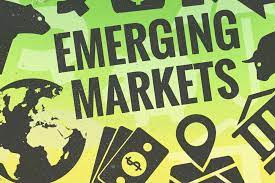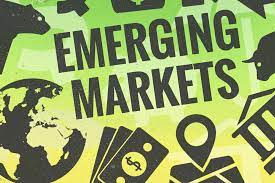
Although many investors are hopeful that 2023 could bring some relief, it has been a difficult year for emerging markets, with more governments stumbling into default, currencies suffering, and double-digit losses in both stocks and bonds.
The events, trends, and subjects listed below are what investors anticipate will have an impact on the outlook for emerging markets in 2019.
A slower rate of interest rate increases in the US and other major economies could pave the way for a recovery in emerging markets in 2023, with a weaker dollar and declining inflation providing much-needed relief.
Although recession worries in the United States and Europe are casting a shadow over global markets generally, especially in the first half of the year, developing economies are expected to cling to their growth differential over developed peers.
"The economic downturns along with the aggressive monetary tightening and geopolitical and commodity shocks that induce them will be temporarily painful in financial and emerging markets," said David Folkerts-Landau, group chief economist at Deutsche Bank.
If emerging central banks are unable to lower interest rates for the majority of the year, recovery could be delayed.
Although China makes up nearly a fifth of the world's gross domestic product, the prospect of a sharp upswing at a time of slow global growth is alluring. China's reopening after its COVID-19 lockdowns will be bumpy.
From mid-2023 onward, analysts anticipate a sharp increase in investment and consumption in the second-largest economy in the world.
"If you look at the savings rate for China right now, it's very elevated," said Erik Zipf, head of emerging market equities at DuPont Capital. "We think that's going to get spent as soon as people feel comfortable to go out, that's going to provide a pretty big tailwind from an economic perspective."
Markets and the global economy were shaken by Russia's invasion of Ukraine, and how the conflict develops in 2023—whether it escalates, continues, or moves closer to a resolution—could be just as crucial.
Globally, the war has changed how people perceive geopolitical risk, food security, inflation pressures, and energy markets—factors that are frequently more acutely felt in emerging economies. From refugee movements to the brain drain from Russia, emerging Europe has also experienced the immediate humanitarian effects.
Following COVID-19 and the war in Ukraine, a growing number of nations are experiencing debt distress. Zambia and Ethiopia are attempting to reduce debt loads under the Group of 20 Common Framework. In 2022, Sri Lanka and Ghana went into default.
However, compared to prior episodes of debt distress, a more complex mix of creditors, including the emergence of China as the top bilateral lender, have made the process lengthy and difficult.
"To get them all singing the same song in the same key is quite challenging", said Tim Samples, associate professor of Legal Studies at the Terry College of Business.
Although there may be a saving grace, the number of nations barred from capital markets among smaller, riskier economies is at historic highs.
"There's not actually a lot of debt maturing next year," said Carmen Altenkirch, emerging markets sovereign analyst at Aviva Investors. "The country that's probably most at risk is Pakistan."
Markets are already watching for signs of a fiscal anchor to control spending in Latin America's biggest economy as president-elect Luiz Inacio Lula da Silva takes office on January 1.
Policymakers have called attention to the risk of inflation posed by da Silva's plan to spend 168 billion reais ($31.6 billion) to fulfill campaign promises.
"Investors want to know if the debt-to-GDP in Brazil is explosive or under upward pressure, whether we're hitting 100% debt to GDP anytime soon, or we can stabilize it over the next two or three years," said Gordian Kemen, head of EM Sovereign Strategy (West) at Standard Chartered Bank.
As Turks head to the polls in the most prominent election in emerging markets, President Tayyip Erdogan may face the greatest political challenge of his 20 years in office.
The lira recently hit a record low against the dollar as the nation struggled with rising living expenses and a falling currency. Many investors have reduced their exposure to the nation's assets as a result of years of unconventional monetary policy. A change in management could herald a remarkable improvement.
"This is potentially the most interesting story of 2023, one way or another," said David Hauner, head of EM Cross-Asset Strategy & Economics, EMEA, Bank of America Global Research.
Elections are upcoming in a number of other emerging market nations. Nigeria, the most populous country in Africa, will hold elections for its next president in February; incumbent Muhammadu Buhari will not run because of term limits.
Argentina will hold presidential elections in October, taking place in Latin America. Cristina Fernandez de Kirchner, a two-term president and vice president, declared after an Argentine court sentenced her to six years in prison in a prominent corruption case that she "would not be a candidate for anything" in the general election.
Election results in Poland that could result in the nationalist Law and Justice party (PiS) losing power could alter the tense relationship between Warsaw and Brussels.
(Source:www.economictimes.com)
The events, trends, and subjects listed below are what investors anticipate will have an impact on the outlook for emerging markets in 2019.
A slower rate of interest rate increases in the US and other major economies could pave the way for a recovery in emerging markets in 2023, with a weaker dollar and declining inflation providing much-needed relief.
Although recession worries in the United States and Europe are casting a shadow over global markets generally, especially in the first half of the year, developing economies are expected to cling to their growth differential over developed peers.
"The economic downturns along with the aggressive monetary tightening and geopolitical and commodity shocks that induce them will be temporarily painful in financial and emerging markets," said David Folkerts-Landau, group chief economist at Deutsche Bank.
If emerging central banks are unable to lower interest rates for the majority of the year, recovery could be delayed.
Although China makes up nearly a fifth of the world's gross domestic product, the prospect of a sharp upswing at a time of slow global growth is alluring. China's reopening after its COVID-19 lockdowns will be bumpy.
From mid-2023 onward, analysts anticipate a sharp increase in investment and consumption in the second-largest economy in the world.
"If you look at the savings rate for China right now, it's very elevated," said Erik Zipf, head of emerging market equities at DuPont Capital. "We think that's going to get spent as soon as people feel comfortable to go out, that's going to provide a pretty big tailwind from an economic perspective."
Markets and the global economy were shaken by Russia's invasion of Ukraine, and how the conflict develops in 2023—whether it escalates, continues, or moves closer to a resolution—could be just as crucial.
Globally, the war has changed how people perceive geopolitical risk, food security, inflation pressures, and energy markets—factors that are frequently more acutely felt in emerging economies. From refugee movements to the brain drain from Russia, emerging Europe has also experienced the immediate humanitarian effects.
Following COVID-19 and the war in Ukraine, a growing number of nations are experiencing debt distress. Zambia and Ethiopia are attempting to reduce debt loads under the Group of 20 Common Framework. In 2022, Sri Lanka and Ghana went into default.
However, compared to prior episodes of debt distress, a more complex mix of creditors, including the emergence of China as the top bilateral lender, have made the process lengthy and difficult.
"To get them all singing the same song in the same key is quite challenging", said Tim Samples, associate professor of Legal Studies at the Terry College of Business.
Although there may be a saving grace, the number of nations barred from capital markets among smaller, riskier economies is at historic highs.
"There's not actually a lot of debt maturing next year," said Carmen Altenkirch, emerging markets sovereign analyst at Aviva Investors. "The country that's probably most at risk is Pakistan."
Markets are already watching for signs of a fiscal anchor to control spending in Latin America's biggest economy as president-elect Luiz Inacio Lula da Silva takes office on January 1.
Policymakers have called attention to the risk of inflation posed by da Silva's plan to spend 168 billion reais ($31.6 billion) to fulfill campaign promises.
"Investors want to know if the debt-to-GDP in Brazil is explosive or under upward pressure, whether we're hitting 100% debt to GDP anytime soon, or we can stabilize it over the next two or three years," said Gordian Kemen, head of EM Sovereign Strategy (West) at Standard Chartered Bank.
As Turks head to the polls in the most prominent election in emerging markets, President Tayyip Erdogan may face the greatest political challenge of his 20 years in office.
The lira recently hit a record low against the dollar as the nation struggled with rising living expenses and a falling currency. Many investors have reduced their exposure to the nation's assets as a result of years of unconventional monetary policy. A change in management could herald a remarkable improvement.
"This is potentially the most interesting story of 2023, one way or another," said David Hauner, head of EM Cross-Asset Strategy & Economics, EMEA, Bank of America Global Research.
Elections are upcoming in a number of other emerging market nations. Nigeria, the most populous country in Africa, will hold elections for its next president in February; incumbent Muhammadu Buhari will not run because of term limits.
Argentina will hold presidential elections in October, taking place in Latin America. Cristina Fernandez de Kirchner, a two-term president and vice president, declared after an Argentine court sentenced her to six years in prison in a prominent corruption case that she "would not be a candidate for anything" in the general election.
Election results in Poland that could result in the nationalist Law and Justice party (PiS) losing power could alter the tense relationship between Warsaw and Brussels.
(Source:www.economictimes.com)





